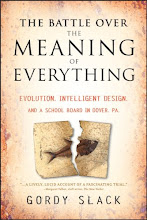 |
| Stanford Professor Kwabena Boahen |
Boahen started his talk, which was essentially like the TED lecture he gave a couple of years ago, by highlighting the extravagant relative inefficiency of computers. A computer processing information at a speed nearing the brain's uses about 100,000 times as much energy as the three pounds of tapioca sealed in bone balanced on your spine. To run such a computer, IBM's Blue Gene for instance, requires the power it takes to keep 1,200 US homes humming. Your brain can do the same job on a bowl of Ramen. Boahen wants to know how the brain does it, and to build computers that are equally efficient.
While "the accuracy of our computers is dependent on an extravagant use of energy," writes Douglass Fox in his good profile of Boahen in Esquire, "the brain uses something messier called population coding of information, in which intelligence emerges from the capacity of hundreds of thousands of extremely low-energy brain cells to synchronize their pulses." If I get the gist, the approach is so "massively parallel," so that, Boahen says, "it is a network in the literal sense of the word; the net does the work." And apparently, Boahen projects, his biomorphic chips may one day be 1,000 times more efficient than a standard computer's.
His Neurogrid computer platform actually emulates neurological ion channel activity to simulate the "softwired' way the brain turns its transistors on and off. Currently, it simulates about a million neurons and six billion synapses in real biological time. Your brain's got about a hundred billion neurons and a quadrillion synaptic connections, so Boahen has quite a way to go. But good luck to him.


1 comment:
This work is fascinating. Did Dr. Boahen talk to you about whether the "brain" could ever achieve consciousness? And, aside from that, what do you find the most interesting discovery about neurons, aside from what you've written here?
Post a Comment